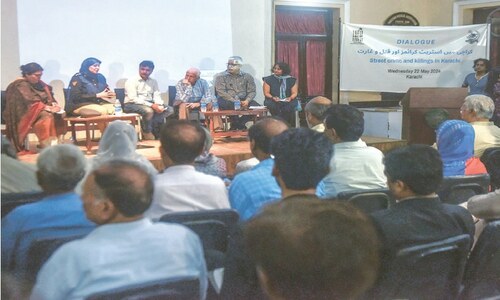KARACHI, July 2: The third session in the Perween Rahman lecture series on Tuesday focused on community theatre and its connection with social change and uplift. Cultural activist Sheema Kermani, who has a long association with community theatre and is among the founders of Tehreek-i-Niswan, a forum for the performing arts with a particular focus on women’s empowerment, spoke about the potential of theatre to challenge the status quo.
Ms Kermani was introduced by architect Arif Hasan who spoke briefly about Ms Rahman’s fondness for films, music and drama and said that her strong aesthetic sense that extended to her personal, social and political beliefs was central to her work.
She discussed at length community theatre’s link with Ms Rahman’s work at the Orangi Pilot Project. Tehreek-i-Niswan has held many performances in Orangi over the years and Ms Kermani said that it didn’t take much convincing for them to get Ms Rahman on board with their vision.
Going into the history of Tehreek-i-Niswan, Ms Kermani said they realised with their first play, Dard kay Faslay, that theatre provided a unique chance for dialogue with stakeholders. While acknowledging that it was hard to judge the impact of cultural activities on a group, the cultural activist said that an increase in self-confidence and expression as well as in community-building initiatives could be observed in places where community theatre was performed regularly. She cited many examples in which their audience was moved enough to question and challenge repressive practices. In an Orangi school where they had performed monthly for three years, women from the community decided to open a centre for themselves. At another place, a man watching a play about a woman in an abusive relationship said their performance had given him hope that maybe his daughter, too, who was facing many difficulties, could change her life around like the character in the play.
According to Ms Kermani, the receptivity of community theatre has increased a lot over time and there is great demand for it by people working at the grassroots even as support and encouragement for the performing arts remain low in the country.
The talk was followed by a ten-minute video in which short segments from different Tehreek-i-Niswan plays were shown, focusing on issues such as early marriage and maternal health, women’s rights and honour killings. These segments were interspersed with clips of people, including that of Ms Rahman, discussing the impact of these dramas. Finally, what was called a ‘trailer’ of a long play was put up by Tehreek-i-Niswan actors, about Ms Rahman’s life and work. A bit too literal a take on the tragedy, it was nevertheless well-acted and tried to explore the possible motives for Ms Rahman’s murder and the cost suffered by those nearest to her.
It was announced that the series of lectures will continue after Ramazan.














































Dear visitor, the comments section is undergoing an overhaul and will return soon.